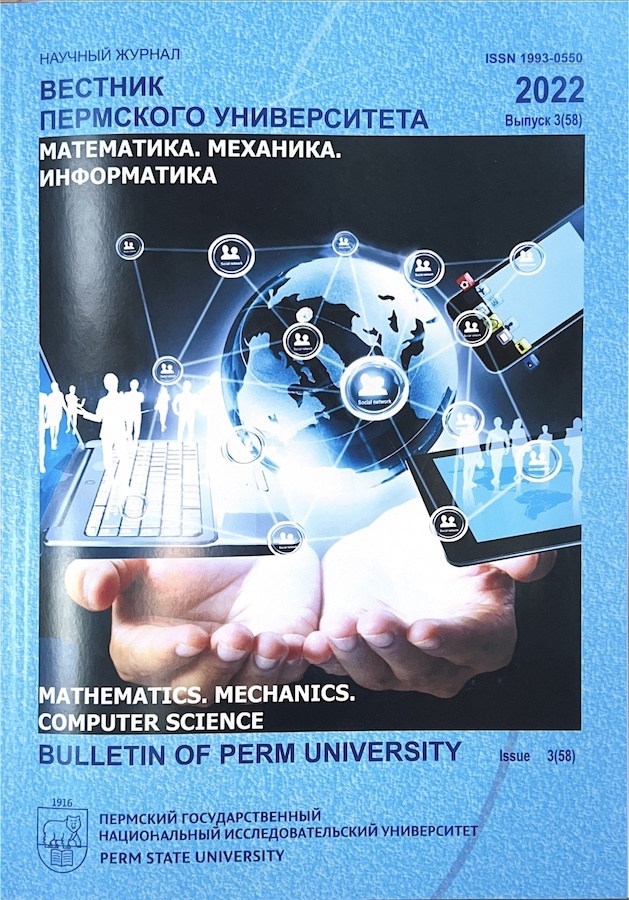Mathematical Models of Temperature and Precipitation Forecasting Using Fractal and Fourier-Analysis of Meteorological Series
- Autores: Mitin V.Y.1, Aptukov V.N.1
-
Afiliações:
- Perm State University
- Edição: Nº 1 (64) (2024)
- Páginas: 33-42
- Seção: Mechanics
- URL: https://journal-vniispk.ru/1993-0550/article/view/307267
- DOI: https://doi.org/10.17072/1993-0550-2024-1-33-42
- ID: 307267
Citar
Texto integral
Resumo
The article presents a methodology for constructing statistical models that can be used to predict the temperature regime and precipitation for the upcoming month. Temperature and precipitation are predicted on a two-element scale (high or low parameter value). Within the framework of the considered examples, it was found that temperature is predicted better than precipitation, and recently the accuracy of forecasts tends to increase. The article also provides a detailed analysis of the model parameters, including their change in the annual cycle, trends in the dynamics of change over the past 80 years, and the correlation between climatic parameters. Along with the basic statistical functions of climatic indicators, the models contain fractal parameters (fractal index) and parameters of the discrete Fourier transform (amplitude and phase of the first harmonic). It was found that the fractal indices of monthly series of average daily temperatures is lower than those for monthly series containing daily temperature values.
Sobre autores
V. Mitin
Perm State University
Autor responsável pela correspondência
Email: victormitin@ya.ru
Assistant, Department of Fundamental Mathematics 614068, Russia, Perm, Bukireva St., 15
V. Aptukov
Perm State University
Email: aptukov@psu.ru
Doctor of Technical Science, Professor, Head of Department of Fundamental Mathematics 614068, Russia, Perm, Bukireva St., 15
Bibliografia
- Arguchintseva, A.V. (2007), "Methods of statistical processing and analysis of hydrological observations", Irkutsk, 105 p.
- Degtyarev, A.S., Drabenko, V.A., Drabenko, V.A. (2015), "Statistical methods of processing meteorological information", St. Petersburg: Andreevsky Publishing House LLC, 225 p.
- Malini, V.I. (2007), "Statistical methods of analysis of hydrometeorological information", St. Petersburg: RGGMU, 279 p.
- Druzhinin, V.S., Sikan, A.V. (2001), "Methods of statistical processing of hydrometeorological information", St. Petersburg: Publishing house of RGGMU, 167 p.
- Teplitsyn, G.P. (2010), "Forecasting precipitation amounts and average monthly temperatures of the months of the warm period of the year by the months of the preceding cold period", Actual problems of the forest complex, no. 25, pp. 64-67.
- Teplitsyn, G.P., Zintsova, E.A. (2011), "On the relationship between precipitation and tempera-ture of the cold and subsequent warm period in the south of the Khabarovsk Territory", Meteor-ology and hydrology, no. 10, pp. 70-73.
- Dubovikov, M.M. (2003), "Index of variation-nand its application to the analysis of fractal structures", Scientific almanac Gordon, no. 1, pp. 5-33.
- Dubovikov, M.M., Kryanev, A.V., Starchenko, N.V. (2004), "The dimension of minimum coverage and local analysis of fractal time series", Bulletin of RUDN, vol. 3, no. 1, pp. 30-44.
- Mandelbrot, B. (2002), "Fractal geometry of nature", Moscow; Publishing House of the Institute of Computer Research, 656 p.
- Kuzminykh, E.V. (2012), "Fractal analysis of climatic series: master's thesis", St. Petersburg: RGGMU, 284 p.
- Solntsev, L.A., Yudin, D.I., Snegireva, M.S., Gelashvili, D.B. (2007), "Fractal analysis of the secular course of average air temperature in Nizhny Novgorod", Bulletin of Nizhny Novgorod University named after N. I. Lobachevsky, no. 4, pp. 88-91.
- Aptukov, V.N., Mitin, V.Y. (2019), "Fractal analysis of meteorological series using the minimal covering method", Geographical
- Bulletin, no. 2(49), pp. 67-79.
- Mitin, V.Y. (2020), "Fractal characteristics of the series of basic climatic parameters in Perm", Bulletin of the Perm University. Mathematics. Mechanics. Computer Science, no. 1(48), pp. 47-52.
- Aptukov, V.N., Mitin, V.Y. (2020), "Statistical model for forecasting average monthly anomalies of temperature regime and precipitation in Perm", Digital geography: mat. AllRussian scientific and practical conference with international participation. Perm, vol. 1, pp. 359-361.
- Aptukov, V.N. Mitin, V.Y. (2021), "Statistical models for forecasting average monthly tempera-ture and precipitation in Perm", Geographical Bulletin, no. 2, pp. 84-95.
- Mitin, V.Y. (2021), "Mathematical models for forecasting temperature and precipitation anomalies in Perm", Mathematics and interdisciplinary research-2021, pp. 32-35.
Arquivos suplementares









